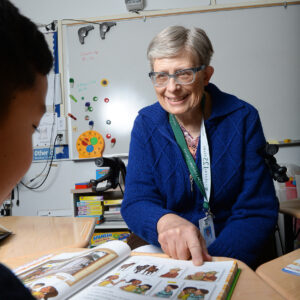This article originally appeared in the winter 2011 Harker Quarterly.
Like so much else in life, there is a paradox at the heart of education and parenting. On the one hand we are supposed to love children for who they are, and on the other hand we are supposed to hold them up to ideals so that they become something other than they are. This is not unlike a related paradox in education: if children, as they learn, understand new knowledge only as it relates to prior knowledge, how can they ever really learn anything new?
To understand a child, says Jiddu Krishnamurti in his “Education and the Significance of Life,” you cannot look at him through “the screen of an ideal.” Krishnamurti means, I believe, that if you see a child through the screen of an ideal you see the ideal but not the child. Also, you and the child will not be in direct relationship. You will be relating to your image or ideal – one of your own projections – not the child himself.
We all hold our children up to ideals. One of the insidious ways we do this is through comparing. What grade did your child get on that assignment? What level is he in? How many APs has he signed up for? How much volunteering has he done lately? “Humility is not comparing,” a former boss used to say to me.
Before becoming a parent, I imagined all sorts of ideals I would hold in front of my children. Then came the reality of a human being. We were out to dinner with a family a few weeks ago and, while waiting for the food to arrive, my oldest son and his friend colored together. His friend colored within the lines a little more precisely than my son did. A lot more precisely. I think his choice of color was more textured too. I couldn’t help comparing. I even considered getting a coloring tutor.
Love children as they are or hold them up to ideals? Both? Are both possible? Parents and educators are anxious about the future. In “That Used to Be Us,” Thomas Friedman and Michael Mandelbaum outline four major challenges to the United States that we have been slow to address over the past 20 years. They are globalization, the IT revolution, national and local debt, and energy. All of these pressures and others make parents and educators nervous. Our children will have to “compete,” won’t they?
When I was a child, I remember adults warning us about “the real world” as if the current world we were living in was “unreal.” Now we are fond of saying that children will have to “compete.” I wonder about the idea of educating and raising an army of little competitors. Why? Well, to maintain or increase our standard of living. To buy more toasters. We all want our children to be successful and happy, but defining success has beguiled thinkers from Lao Tzu to Aristotle to Emerson to Deepak Chopra.
So how to resolve the paradoxes at the heart of education and parenting? Paradoxes are, by definition, irresolvable. William Empson said that, “Life involves maintaining oneself between contradictions that cannot be solved by analysis.” Zeno, an ancient Greek philosopher, discovered a paradox that should keep us from walking out the door. He said that we can never get from point A to point B because there will always be a new midpoint between us and our destination that we first have to cross.
However, we do manage to get out the door every day, and children manage to grow into wonderful young men and women despite educational paradoxes, comparisons and ideals. My son didn’t color as well as his friend, but he did play out a terrible thunderstorm with his crayons. Just like flowers reaching for the sun and yet remaining firmly planted where they are, children find their way, and that is an ideal in itself.











